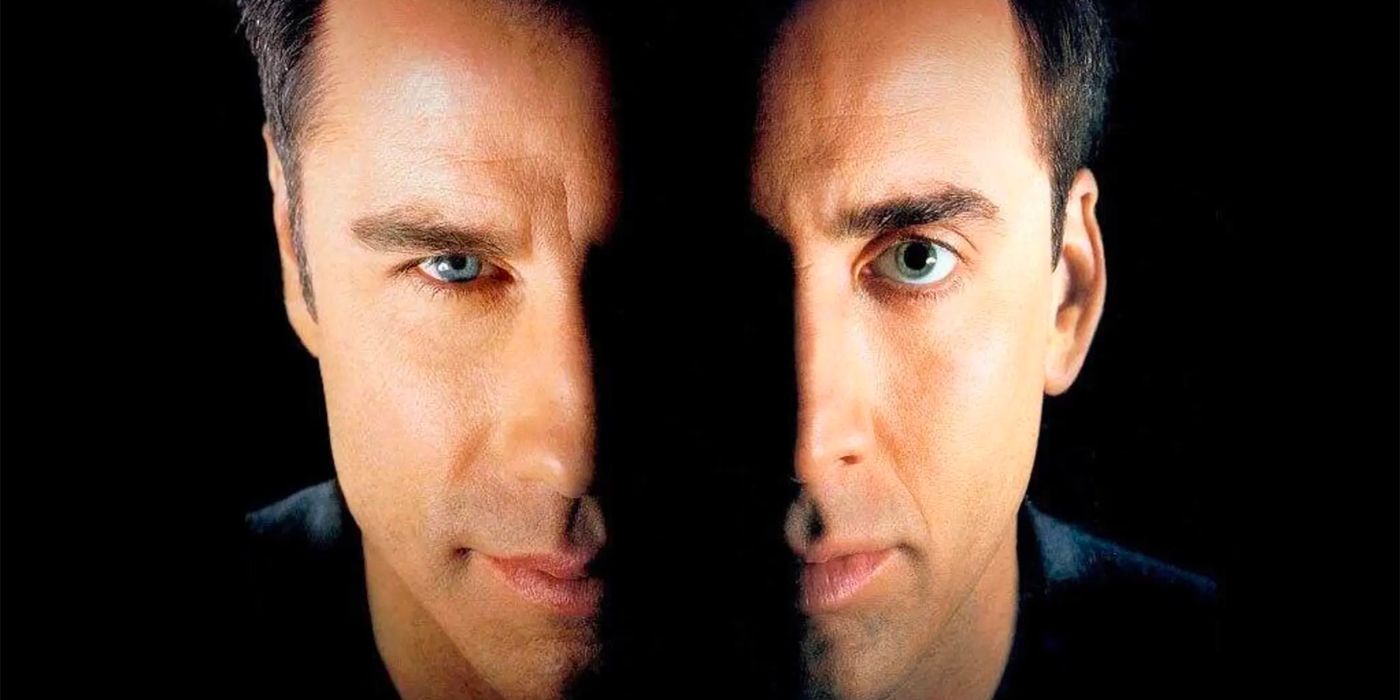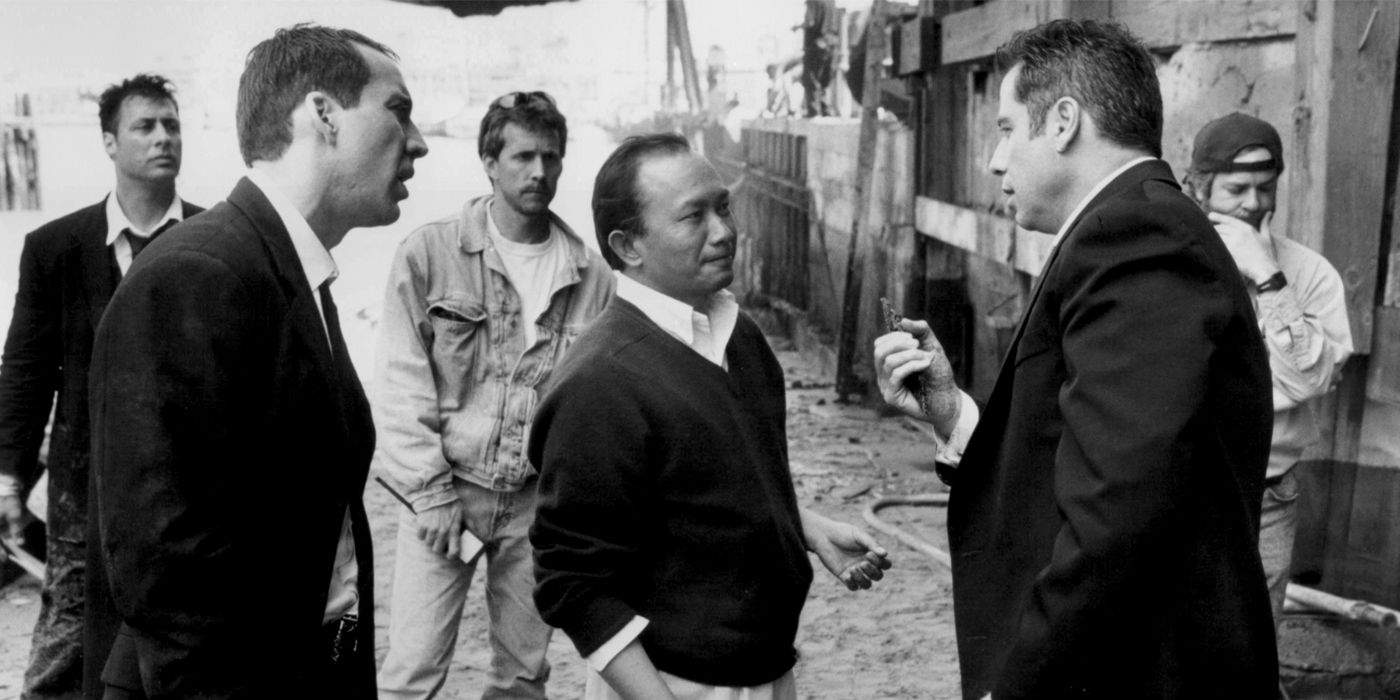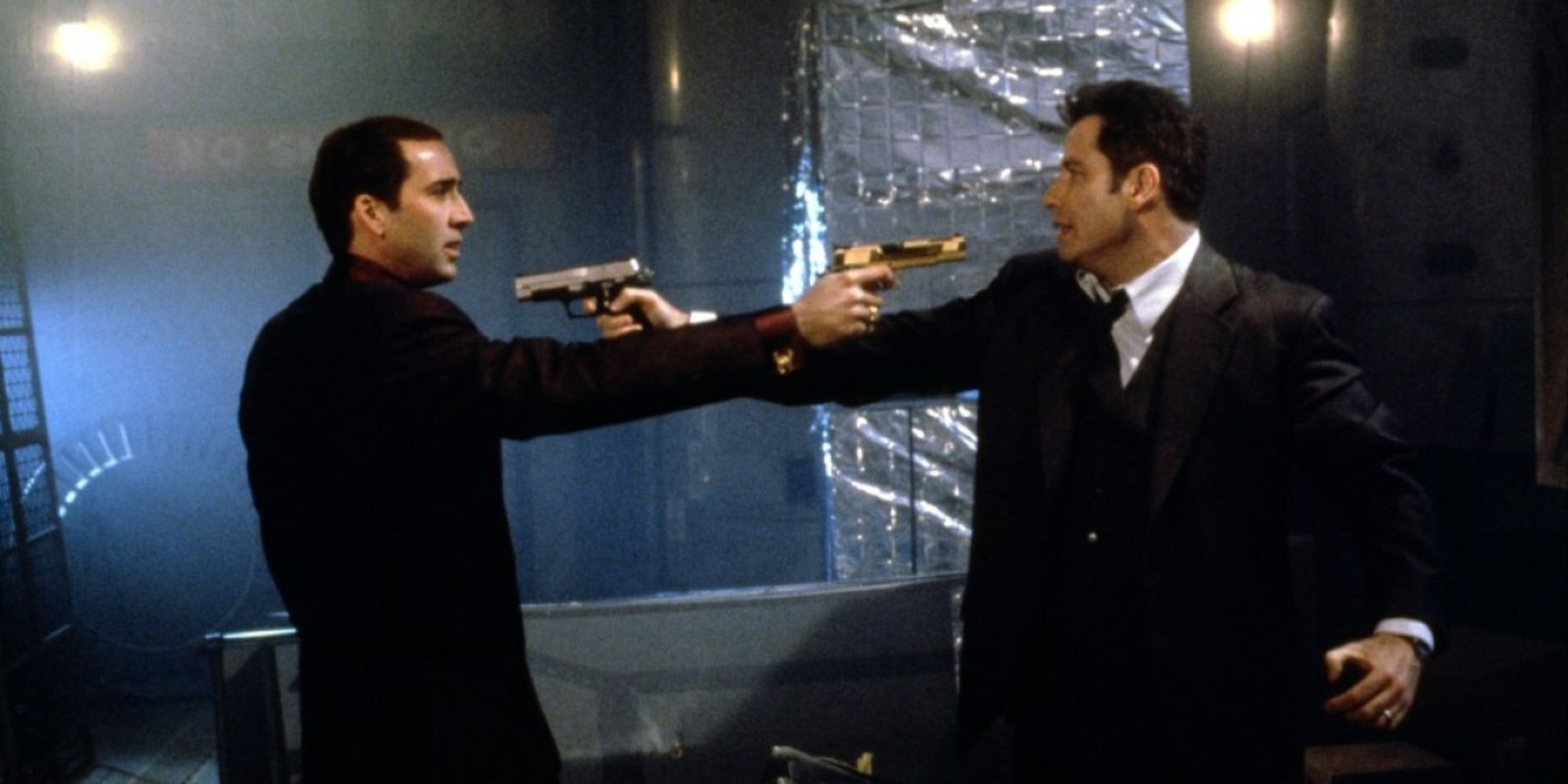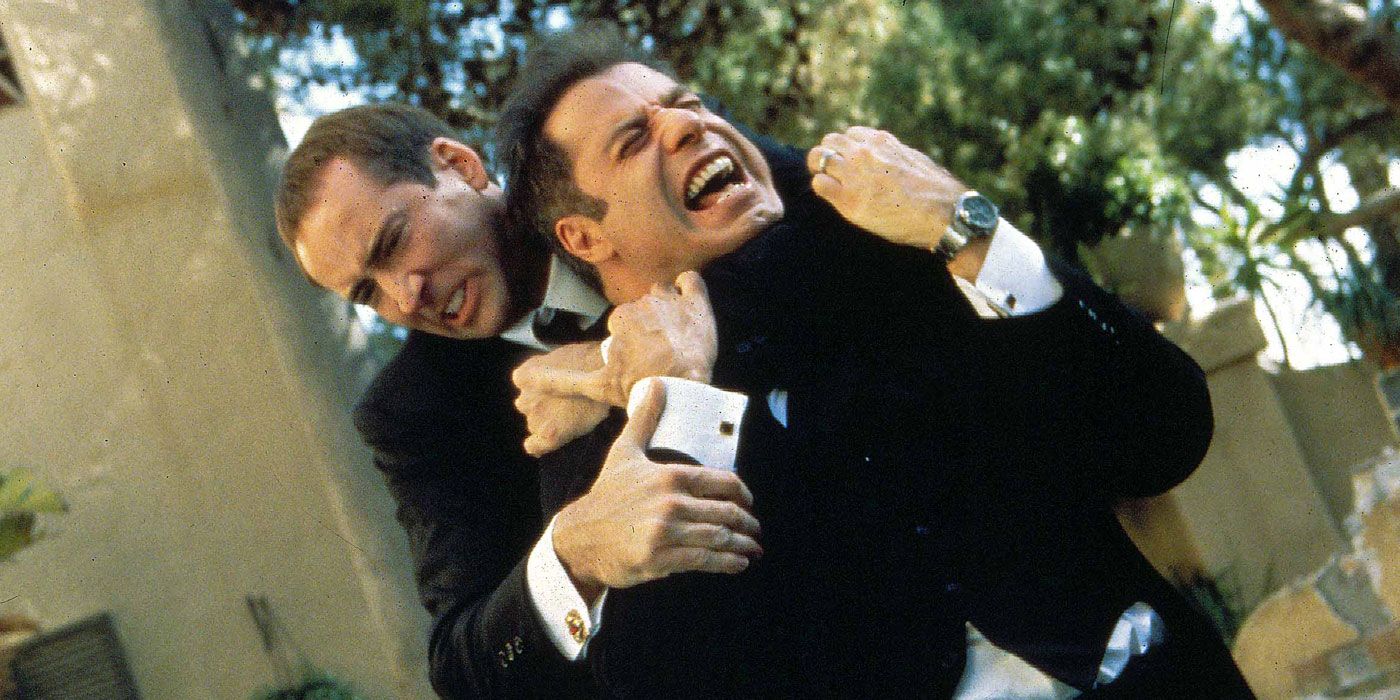How does one begin to describe Face/Off? Search through contemporary reviews and recent retrospectives and it’s words like “crazy” and “ridiculous,” even “cheesy” and “stupid.” This is a movie about two men – one special agent and one terrorist – who swap faces in a surgical procedure. A rendition of “Over the Rainbow” plays during a gunfight. Nicolas Cage grabs a woman’s butt and goes, “Agh!” while dressed up as a priest. Love it or hate it, everyone can likely agree on one thing: It’s impossible to take this movie entirely seriously. Nobody could. Except for maybe Andrew Lau, who told the South China Morning Post that “Around 1998, I saw Face/Off, and I really liked that movie.” An unusually reserved response. He continues, “With that movie as an inspiration, I began to think about a story in which two people swap identities.” That story turned into the Hong Kong blockbuster Infernal Affairs, which was remade in America as The Departed. A genealogical line from the infamous hand gesture to the Oscar for Best Picture.
Face/Off is directed by John Woo, who blurred the lines between cop and criminal in action masterpieces like Hard Boiled and especially The Killer, which borrowed heavily from the French classic Le Samourai. Sandwiched between cinematic literacy and the critical acclaim of its offspring is happy-go-lucky Face/Off, only the most over-the-top of high-concept American action movies in the 1990s. “What if convicts hijacked a plane” is one thing, because those convicts never wore magnet boots in a prison left over from the production of Brazil. A technical marvel and successful entertainment, Face/Off challenges our instinct toward “So bad it’s good.” Instead, it’s a good movie wearing the face of a bad one – or is it vice versa?
Before 'Face/Off,' John Woo Had a Rocky Start in America
John Woo’s career is marked by an unfortunate stateside detour with duds like Paycheck and Windtalkers. Indeed, possibly the greatest action director of all time turned in everybody’s least favorite Mission: Impossible. He was welcomed by American producers impressed by his work in Hong Kong, and he had early fans in Sam Raimi and Jean-Claude Van Damme, but studio interference is often cited for the suppression of his style in Hard Target and Broken Arrow. Where was the slow-motion gun fu style that audiences were accustomed to? It wouldn’t be until 1997 that the director was truly unleashed, with Face/Off being the one quintessential Woo film produced in America. Bearing his hallmarks and technical craftsmanship, it also acts as a summary of his Hollywood career, bringing in a previous lead in John Travolta (Broken Arrow) while anticipating a later collaboration with Nicolas Cage, and the face-mask conceit from Mission: Impossible 2.
The problem with John Woo’s American experiment is that he applied the same action style to every setting. World War II? Gun fu. Science fiction? Gun fu. These movies were far more thematically broad than, say, A Better Tomorrow and Bullet in the Head. Face/Off, then, is the breath of relief, a satisfying match of director to material. The screenplay, written by Mike Werb and Michael Colleary, plays to Woo’s strengths and is smartly written in itself. At its heart, Face/Off is a science fiction movie, which would explain that strange scene where John Travolta’s character Sean Archer, now played by Nicolas Cage, turns to his fellow agent Tito (Robert Wisdom) and says that his face itches. Tito then massages his face. It’s a throwaway moment, but one that suggests the writers’ approach. “Maybe it itches” is one answer to the question of “What would happen if a guy was wearing someone else’s face?” and that thought process effects a staple of the genre: world-building.
'Face/Off' Builds Two Worlds for Its Characters
Despite making business of the illogical, everything in Face/Off is logical, it’s communicated. And in addition to feeling built, the world is also exciting. After the terrorist Castor Troy (Nicolas Cage) erases all evidence of his surgical switch with Sean, he takes to his new position as a federal agent like a kid playing Grand Theft Auto, only the car is Travolta. There’s an anarchic glee that even his FBI coworkers – oblivious to his true identity – find infectious. When the boss starts berating him, Castor lives out everyone’s fantasy by blowing him off. The hierarchies and structures that entrap everyone else don’t apply here. And extending the world-as-playground appeal, Woo keeps the camera moving, staging action as much vertically as horizontally. Characters jump between buildings and crash through skylights; anything is possible.
Of course, the flip side of Castor’s joyride is Sean’s imprisonment. He’s wearing the face of a terrorist with no proof that he is, as he claims, a decorated agent. This is where the magnetic prison comes in, overseen by an authoritarian warden (John Carroll Lynch) who meets Sean’s protestations with violence. The setting is introduced with references to the Geneva Convention and Amnesty International, which can’t touch this place. “When I get out of here, I’m gonna have you fired,” Sean says, now having experienced the other side of the law. When his prison break turns into a bloodbath, he actually tries to save the lives of his fellow inmates, men he’d previously imprisoned. Meanwhile, Castor is insinuating himself into Sean’s family life, visiting the grave of the man’s dead son with his wife (Joan Allen) and giving his daughter (Dominique Swain) a bit of life advice. In fact, when the daughter is sexually assaulted by her boyfriend in the driveway, Castor pulls him through the car window for a beating. This is another kind of fantasy, but one damning in its accidental critique. The terrorist is at home here, anticipating several years in advance a haunting scene from the first season of True Detective.
The Inevitable Limits of 'Face/Off'
“Accidental” because this is where everything stops short. Face/Off is not secretly a satire of suburban America nor a cutting-edge treatise on the carceral state. Sean’s prison experience doesn’t fully teach him to see his enemies in a different light, and extreme counterterrorism is only labeled “Gestapo tactics” when authored by a terrorist. As Sean and Castor begin their true face-off, the premise actually becomes a dramatic liability. One of Castor’s friends, Dietrich (Nick Cassavetes) practically dies in Sean’s arms and does the usual dying routine about having a good run, but Sean just lets go and moves on. He has no relationship with this guy, outside that time they got high together. The endgame of Face/Off isn’t social commentary or even drama. Instead, it’s the sheer pleasure of John Travolta and Nicolas Cage playing each other, which is so good that only the explosive spectacle of John Woo can properly express it.
When John Travolta delivers a line like, “Sean Archer writes his own ticket, okay?” it’s more than an impression, it’s studied. The glassy stare, the head bobs, the muttering, the laugh. He’s fantastic, skirting the border of parody and slip-sliding through the frame. For his part, Cage takes on a halting, paranoid affect, achieving the emotional persuasion of Travolta’s past. Both actors are playing on a popular understanding of two outsized stars, and it’s irresistibly fun. This is a two-hander star vehicle that actually delivers, as if Heat had more than one coffee shop scene, or the Alien and Predator had a true versus. But while Cage and Travolta were understandably praised by critics, Face/Off is silly with talent that’s eye-popping today. CCH Pounder, Alessandro Nivola, Margaret Cho, Chris Bauer – Thomas Jane? Character actors on parade, but special mention must be reserved for Joan Allen, as she’s given the unenviable task of selling the dramatic consequence of a goofy premise. Where the audience is giddy about the whole face/off thing, as Sean’s wife, she’s devastated by it.
Moviegoers have always responded to the ridiculous setup and rewarding thrills of Face/Off. It’s a premise that lends itself to revival with similar star power, like Andy Lau and Tony Leung in Infernal Affairs, and then Matt Damon and Leonardo DiCaprio in The Departed. In each example, men on opposite sides of the law attempt to disguise themselves, drawing tension with high stakes. However, only one of these films is truly about anything beyond that: the Buddhist fable Infernal Affairs. It’s also a dreary crime drama, where both The Departed and Face/Off are more fun. This approaches the foremost criterion on which each movie ought to be judged: How well do they follow up on their premise? How well do they be themselves? In the case of The Departed, its awards buzz was highly influenced by Martin Scorsese, long overdue for Best Picture. His film is a scatterbrained remake cleansed of the original’s theological musings (ironic, for the director), but it’s an effectively suspenseful thriller. Face/Off trades suspense for spectacle, but also works as a thoughtful – not brainy – action movie. Are the performances good? Technically, they’re overacted. So the question, then, is if they’re the right performances, if they’re entertaining. That’s all that really matters, and the answer is, hell yes.




